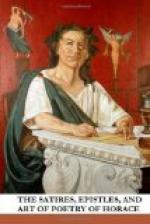PAGE 179.
Yet haste and chance may blink the obvious truth.
I am not sure whether this was the connecting link in Horace’s mind; but I felt that the absence of any link would make the transition between the two sentences intolerably abrupt in English, and go I supplied a link as I best could. Macleane seems right in remarking that the remark “multa ferunt” &c. seems to be drawn forth by the dark picture of old age contained in the preceding verses, and has not much otherwise to do with the subject. Horace doubtless felt that he was passing middle life himself.
PAGE 182.
Yet so that none should
ask it to resign
The sixth, fourth, second
places in the line.
Horace does not mention the sixth place: I have introduced it for the benefit of persons who, as actually happened to me when very young, may attempt to write Iambic trimeters with no guide but this passage, and may be in consequence in danger of making them scazons, as I actually did.
PAGE 188.
Entrust it first to
Maecius’ critic ears,
Your sire’s, and
mine, and keep it back nine years.
Almost a verbal coincidence with Howes, but a coincidence only.
PAGE 189.
Then blush not for the
lyre: Apollo sings
In unison with her who
sweeps its strings.
It is difficult to say whether the paragraph of which these lines are the conclusion is a sketch of the history of poetry in general or of lyric poetry in particular. The former would be rather inartistic after the other historical notices of poetry that have occurred in the poem: the latter is not easily reconciled with the mention of Homer. On the other hand, Horace’s inexactness elsewhere makes either supposition quite possible. I have translated so as to leave the ground open to either.
PAGE 191.
A second Aristarch.
Before them marched that awful Aristarch.
Pope,
Dunciad, Book iv.
PAGE 191.
Leave poets free to perish as they will.
Following Mr. Howes and probably others who have written on the Ars Poetica, though apparently not the latest editors, I regard all the words from “Deus immortalis haberi” to the end as part of Horace’s speech to the man who thinks of rescuing the mad poet. Much of the humour of what follows, e. g. “Nec semel hoc fecit,” “Nec satis apparet,” &c. would, it seems to me, be lost on any other supposition.



